2024 Excellence in Teaching Award Winner: Anthony Alsayed
Three words encapsulate your Northeastern University experience:
Leadership | Enthusiasm |Progress
As a faculty member, what were some of the reasons you chose to join the Northeastern community?
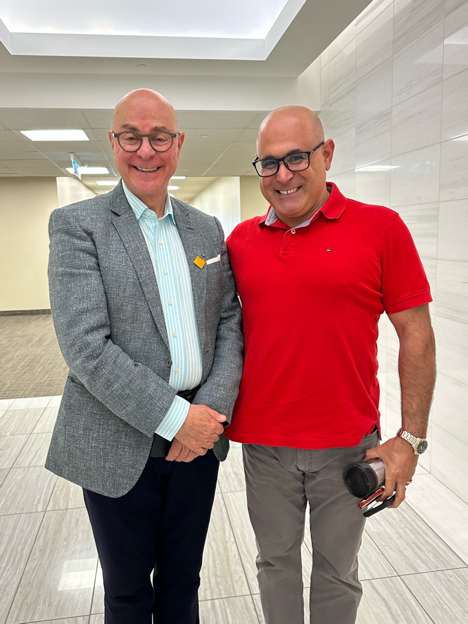
I was looking for a new challenge and a new career chapter. By happy chance, I found a faculty opening with the NU-Toronto Campus. Before applying for this position, I visited the NU website where I learned that Northeastern is a global research university and a recognized leader in experience-powered lifelong learning.
I was also attracted by the university values and the organizational culture and felt inspired by its leaders and the mission that was based on practical training and research. At NU I have more room to do more, produce more, become more, and learn more.
Tell us a little bit more about you. What are your interests? What motivates you?
Teaching is my life’s top priority. I enjoy brainstorming with colleagues to come up with the best creative ideas. I find immense joy when my students exhibit tangible signs of learning in my classroom. Connecting academic concepts to real-life, practical situations is acutely gratifying. At NU, I became a progressive academic and educator where I found that teaching is not merely a profession—it’s a way of life for me.
“Teaching is not merely a profession. It’s a way of life for me.
Anthony Alsayed
What advice do you have for others considering higher education, either as a student or as a career?
I prefer to share my favourite proverbs instead of giving direct advice. These three renowned proverbs continually fuel my teaching passion and leadership skills:
- Latin Proverb: “By Learning you will teach; by teaching you will learn.”
- Native American Saying: “Tell me, and I’ll forget. Show me, and I may not remember. Involve me, and I’ll understand.”
- A Japanese proverb: “A single arrow is easily broken, but not ten in a bundle.”
These timeless words of wisdom resonate deeply with me, guiding my approach to education and inspiring me to create meaningful and immersive learning experiences for my students. Also, I strongly believe that a harmonious team is a true strength that helps to make better and more innovative decisions.
What other passions do you have outside of teaching?
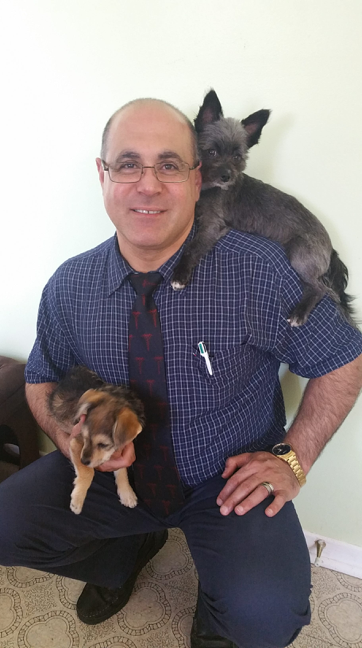
Outside of my work, I’m a family man. I like to spend quality time with my family and our pets, practice a healthy lifestyle, keep myself fit, and attend the gym several times a week. I’m also a chess player and enjoy volunteering in the community to train new generations on chess strategies. Also, I am dedicated to ongoing personal and professional development.
How would you describe yourself to others?
I’m a multi-specialized professional with more than 25 years of experience in the medical and healthcare field, clinical and academic research, academia and teaching, as well as strategic management and healthcare leadership. I was fortunate to be trained in various academic institutions, different countries, and languages (I speak English, French, Russian, and Lebanese). I’m a multicultural individual or global citizen.
My greatest achievements: I have been able to incorporate my research results into practice and in my workplaces. For example: Stimulating my student performance and skills by using simulated activities and practicing stress-free teaching-learning methodology. I would describe myself as an extremely organized professional, positive, enthusiastic, goal-oriented, resourceful, and quickly adapting to new situations or changes. I am an excellent team player and I enjoy working with talented people, but I also excel working independently with respect to work ethics, behavioral management, and with strong leadership skills.
It is a privilege to be part of Northeastern’s commitment to using education as a catalyst to address global health challenges. It’s a great honor for me to become a member of the esteemed faculty, to have the opportunity to contribute to the university’s academic mission, and to achieve more under our NU’s tremendous leaders.
“I wanted the women to tell their stories” – Tracy Threatt
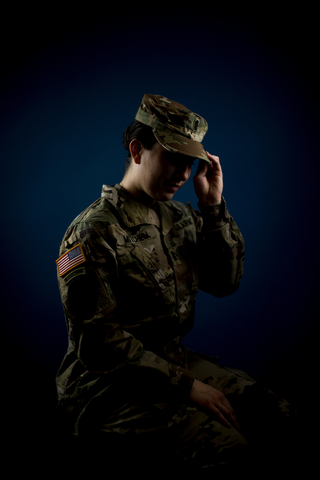
Northeastern graduate making female veterans feel less ‘invisible’ with help from the George W. Bush Presidential Center
CPS Alumn, Tracy Threatt, helps female veterans feel less ‘invisible’. She was recently named as a scholar in the Stand-To Veteran Leadership Program at the George W. Bush Presidential Center in Dallas, and she embodies the college’s ethos of bringing opportunity to those she meets.
Baseball Player Sidelined by Disability Hits Home Run With Education
After a sudden and serious medical condition ended his baseball career, Ryan Westmoreland, CPS bachelor’s student in liberal studies with a focus on leadership and business management, is reinventing himself in the sport he loves.
Small Business Owner Makes Big Move in Support of Ukraine
For more than ten years, College of Professional Studies alumna Natalie Kaminski ’06 owned a successful software company outside of Moscow. But when Russia attacked Ukraine earlier this year, the childhood she spent living in Ukraine spurred Kaminski’s decision to quickly help dozens of employees and the business move across the border to Georgia.
After a narrow escape, the company and its employees are making their way in a new home.
CPS Launches Master’s Degree in Applied Logistics
In an era of disruption, new credential will position graduates for success in diverse markets
With business leaders increasingly focused on overcoming the challenges of global disruption, a new degree in logistics promises to prepare graduates for success in multiple fields. Integrating multiple knowledge areas with advanced technology, the Master of Professional Studies in Applied Logistics will train students to respond nimbly to challenging circumstances, leveraging the increasingly important role of logistics and supply chain professionals in daily operations and strategic projects across industries.
“In today’s fast-paced and disrupted market, employers demand graduates ready to hit the ground running, graduates who have mastered the practical side of the complex and sophisticated field of supply chain management,” said Ammar Aamer, Ph.D., associate teaching professor in the Project Management Programs. “In response, the new applied logistics degree focuses on the day-to-day understanding and execution details of logistics and distribution operations within supply chain management. The curriculum is infused with data analytics, emerging technologies, project management, and leadership skills to prepare students to be creative and adaptive in an ever-changing world.”
According to the U.S. Bureau of Labor Statistics, the job market for logisticians—whose median pay in 2021 was $77,030—is projected to grow 30 percent from 2020 to 2030.
Students in the program will learn to handle unexpected challenges and develop leadership and project management skills to help communicate with customers, avoid reactionary responses, work collaboratively to find innovative solutions, and effectively collaborate across supply chains. Using project-based learning and short-term experiential projects, students will train to plan for the worst and lead confidently, responding to disruption without becoming overwhelmed.
The new degree is designed to prepare learners for professional roles that might include transportation, warehouse, and distribution manager; supply chain manager; distribution-center or warehouse operations supervisor; logistics or supply chain analyst; logistics specialist/analyst/manager; purchasing manager; inventory specialist; operations manager or project manager.
Like many CPS programs, the MPS in Applied Logistics was developed in consultation with corporate leaders. Drawing on the expertise of supply chain professionals from companies including Carhartt, Gulfstream, Gap, Inc., and Transportation Insight, faculty consulted a range of employers to better understand their hiring needs, deepening industry connections as they researched industry standards and practices. Then, they built essential professional skills into the curriculum.
Based on this research, the program integrates technical expertise with systems thinking. Students will learn to use descriptive analytics in real time, responding to variables such as changing customer profiles, sales trends, and unusual conditions in supplier networks as they learn to manage inventory, change packaging based on customer demand, and optimize routing among distribution centers as markets shift.
Graduates will thus benefit from a program focused on the applied science of distribution—one that employs a three-part approach to develop awareness and proficiency in existing and new technologies that impact distribution; builds skills and proficiency to holistically analyze and manage the dynamic interactions of the end-to-end supply chain components; and provides students with the tools they will need to confront disruption and confidently manage people and projects in highly fluid and dynamic environments.
Dr. Priscilla H. Douglas Spoke of Interconnectivity, Perseverance, and the Power of ‘Not Yet’ to the Class of 2022
Douglas is author of Woke Leadership: Profits, Prophets and Purpose
Dr. Priscilla H. Douglas shared the wisdom she has earned in decades of government and business leadership with the bachelor’s and master’s degree graduates of the College of Professional Studies at the graduation ceremony on the Boston campus at Matthews Arena, on May 20, 2022. She spoke with a distinct focus on the experience that students have gained through tumultuous times. The business leader, executive coach, author, speaker, and Double Husky who held executive roles at General Motors, Xerox, and Vertex Pharmaceuticals, drew upon her life experiences at Northeastern, and urged the graduates to change their perspective of the future by harnessing the power of the term “NOT YET.”
“The mindful answer is ‘not yet,’” Douglas said. “Keep your future open by answering ‘not yet.’ Keep your dreams alive and don’t fall back on the automatic ‘no.’”
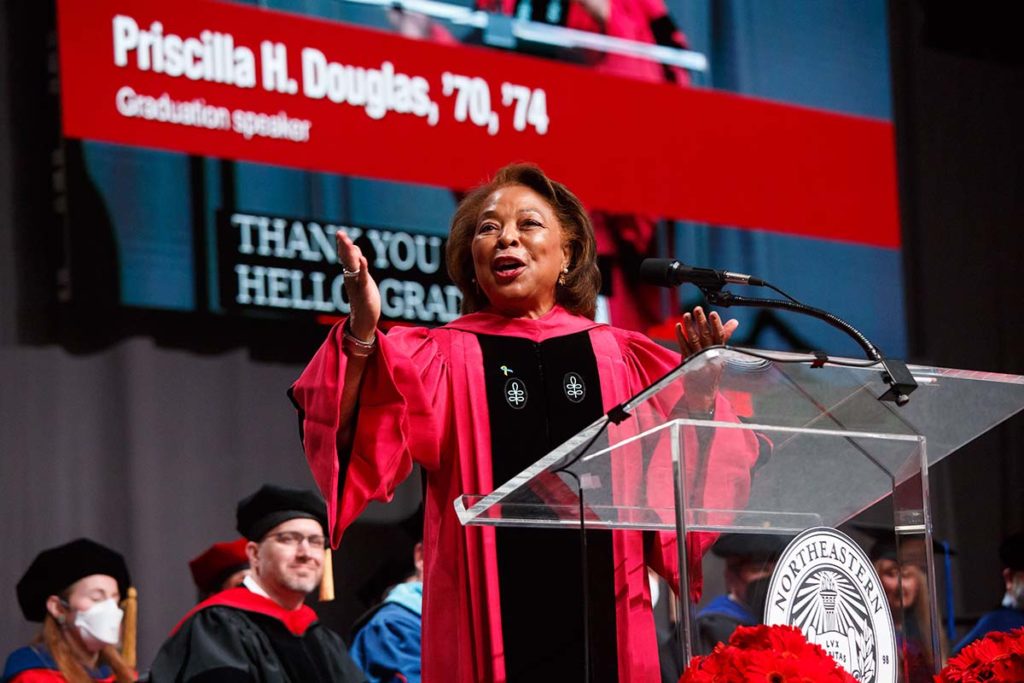
While Douglas has over 30 years of experience in business and government, she took this opportunity to share her times at Northeastern and her worldly experiences using the power of ‘not yet’. “Don’t be too quick to answer no. I didn’t. I raced motorcycles, I competed in bodybuilding, [and] rode my bike from Boston to New York three times. I’m a scuba diver and get this, while earning my doctorate at Harvard. I was a cheerleader for the New England Patriots,” Douglas said as the graduates cheered.
Douglas also spoke about the power of her network that started at Northeastern University, “Network for Life. Consider that success,” she proclaimed. “Reciprocity and love will hold your network together.” She challenged the graduates to “surround yourself with the most eclectic bunch of folks that you can find. They are your pathway, your portal, and your gateway to the future.“
She reminded the graduates that we live in an interconnected global economy in which “relationships are our most valuable resources.”
“We are so grateful to have Dr. Douglas speak to our graduates,” David Fields, Interim Dean of the College of Professional Studies added, expressing his gratitude for Douglas’ ability to galvanize and excite the CPS graduates. Dr. Fields added, “Dr. Douglas spoke to the value of the power of the Northeastern network and the perseverance our alumni will need as they transform the fast-paced, diverse, global business landscape and society.”
“Hold fast to your dreams,” Douglas said as she ended her remarks, “They feel the purpose and passion and they got you here today. But you know what? That passion and purpose—it’s not finished with you. It is not through with you. Not yet!”
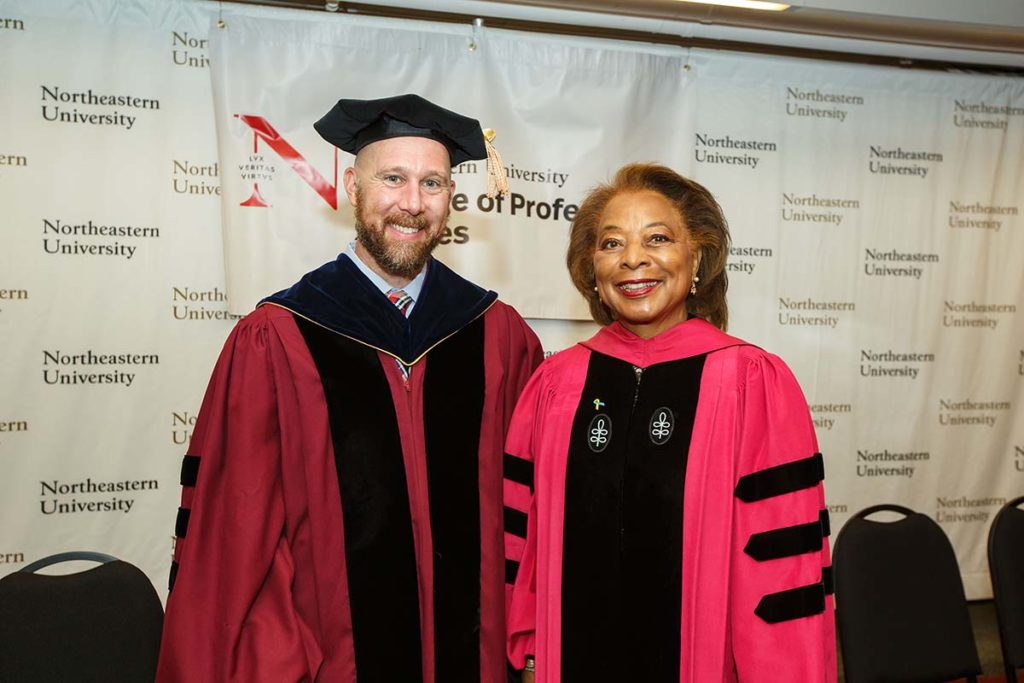
Douglas has worked extensively in state and federal government on both sides of the aisle. In her role as Commonwealth of Massachusetts Assistant Secretary for Public Safety, Douglas launched the Domestic Violence Commission and Hate Crimes Task Force, publishing the state’s first hate crimes report in 1991. She was also the first Black woman to serve in the Massachusetts Cabinet when she was named Secretary of Consumer Affairs and Business Regulation.
Douglas has deep roots at Northeastern. She is a Northeastern University Corporator Emeritus and played a key role in the founding of the John D. O’Bryant African American Institute at Northeastern University. Douglas is the Chair of the Boston Public Library’s Board of Trustees and serves as a member of distinguished boards — American Repertory Theater, the Boston Museum of Science, Leader Bank, and the International Womens’ Forum Massachusetts.
Douglas holds a Bachelor of Science degree in English and History, and a Master of Education, both from Northeastern University, and a Doctor of Education from the Harvard Graduate School of Education.
An Accelerated Degree in Organizational Leadership
With the job market for management positions projected to grow rapidly until at least 2030—and U.S. companies eager to fill a self-described “leadership gap”—an accelerated master’s degree program centered on experiential learning prepares graduates for success in a broad range of fields.
“The new One Year Experiential Master of Science in Organizational Leadership can benefit professionals from all industries,” says Les Stein, assistant teaching professor and faculty director of the program. “This is a one-year degree that can energize graduates’ careers, make them more competitive in their individual professions, and offer opportunities to change their career trajectories or to grow within their current professional context.”
According to Stein, participants in the new program will begin with an introductory course in leadership in which they will conduct a self-inventory of their leadership skills, identifying areas of strength and opportunities for growth. In classes of 15 or fewer, students will explore a wide range of leadership styles, with special emphasis on understanding the ways digital technologies have shifted the landscape of leadership, with social media creating both new risks and new opportunities.
With sponsors from technology, healthcare, manufacturing, financial and other industry sectors providing meaningful, priority projects, and concentrations available in six categories—Coaching, Health Management, Human Resources Management, Leading and Managing Technical Projects, Organizational Communication, and Project Management—the new master’s degree program will give students ample opportunity for experiential learning. Representatives from industry partners will serve as speakers and lecturers, and students will work directly with partner employers to solve problems and connect with industry experts as they navigate the theories and techniques of leadership. The program is designed as a cohort model, offering students the opportunity to develop a network of peers, faculty, and potential employers.
“The accelerated, experiential Master of Science in Organizational Leadership will offer you valuable relationships with your program cohort as you gain firsthand experience in several industries and work alongside experts on real-world projects,” Stein said. “In just one year, you will complete your degree, add considerable connections to your professional network, and become a better candidate for your next promotion or dream job.”
New Graduate Degree in Security and Intelligence
In an era of increased threats to our security, a new master’s degree program in a fast-growing professional field is set to give graduates the tools to anticipate and lead responses to security threats worldwide.
Designed to prepare students for leadership roles in the field of security and intelligence, the Master of Arts in Security and Intelligence Studies offers an interdisciplinary approach that merges security, law, politics, and constitutional rights to create well-rounded security leaders.
“Northeastern University has a long history of preparing individuals for leadership roles in the justice system,” said Faculty Director Jack McDevitt, professor of the practice in criminology and criminal justice and director of Northeastern’s Institute on Race and Justice. “We believe this new degree will be the strongest program yet to prepare security professionals to confront and respond to the increasingly complex challenges facing the United States and the world.”
In a challenging global security environment that is only becoming more complex, security and intelligence-related jobs are expected to expand much more rapidly than the average occupation, according to JobsEQ, a labor market research database. The new degree will equip learners with state-of-the-art training for security roles such as intelligence analyst, special agent, information security officer, corporate security specialist and manager, criminal investigator, or fraud investigator.
Taught by a faculty of security experts with long and diverse experience—including as constitutional lawyers, White House advisors, CIA operatives, military intelligence officers and more—the program will challenge students to gain and hone a broad array of skills through experiential learning as well as classroom and remote pedagogy. Among other critical competencies, participants will learn intelligence collection and dissemination, analysis, research, threat assessment, and evaluation of information and policy development, all while focusing on the importance of civil liberties in pursuing security in civil society.
Master’s candidates in the program will have the opportunity to choose among three concentrations: Strategic Intelligence & Analysis, Homeland Security & Emergency Management, and Corporate Security Management. As they explore a specialized course of study, areas of inquiry will include: the application of current leadership theory and managerial approaches to the security domain to ensure ethical business and strategic practices; the use of historical and contemporary references to explore issues related to homeland security efforts in the US; and the evaluation of key global regions to reveal unique threats and opportunities to interrupt them.
Also emphasized will be the role agencies at all levels of government, federal, state, local as well as the private sector play to prevent and respond to both human made and natural threats.
Students may begin enrolling in the Fall 2022 term.
A Passion for History
With a new syllabus in development, a new book set for release, and a deep well of practical knowledge, Professor Edward H. Miller emphasizes excellence, engagement, and experiential learning.
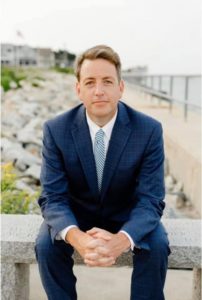
If one were to follow the thread of Professor Edward H. “Ted” Miller’s interest in history all the way back to the beginning, they might find themselves near the southernmost point in the U.S., standing on No Name Bridge in Big Pine Key, staring across Bogie Channel. It was there, Miller says, that in 1960 his grandparents heard the sound of gunfire in the night and wondered, later learning that secret trainings for the Bay of Pigs invasion had been carried out a few miles from their home.
“It was fascinating to me,” says Miller, who vacationed there with his family as a child. “Here in Florida, all these people in retirement, and history’s happening literally in their backyard!”
Miller’s father, Franklin H. Miller, who graduated from Northeastern with a degree in electrical engineering in 1967, passed along that morsel of family lore to the young Miller—along with a love for excavating the ways the past informs the present. Such historical tidbits, Miller says, are what fueled the passion that would eventually lead him to become a professional historian.
“My father was a history buff,” Miller says. “He’d take me on trips to Gettysburg, trips to the LBJ Presidential Library in Austin, a trip to Ford’s Theatre in Washington, D.C. I’d get to bring a friend and we’d have these wonderful experiences. I got hooked.”
Contemplating conspiracy
Miller went on to major in history at Providence College. He later earned his doctorate at Boston College in 2013. His dissertation, “Mavericks of the Metroplex: Dallas Republicans, the Southern Strategy, and the American Right,” became his first book, Nut Country: Right Wing Dallas and the Birth of the Southern Strategy, published in 2015 by the University of Chicago Press. A new book, forthcoming this month from the University of Chicago Press, is titled A Conspiratorial Life: Robert Welch, the John Birch Society, and the Revolution of American Conservatism.
“I wanted to write a biography for the educated general reader,” Miller says of that publication. “And Robert Welch was a crucial figure in the history of American conservatism. If you take a look at what was going on in the 1970s at the John Birch Society, they were very much involved in creating the Reagan Revolution. They were involved in the abortion debates and the tax reform debates and the anti-ERA (Equal Rights Amendment) debates that would promote the Reagan Revolution.”
What Miller couldn’t have guessed when he started writing A Conspiratorial Life in 2014 was that his biography of an American conspiracist would be so timely.
“As we got closer to the date of publication, it just kept getting more relevant,” Miller says. “In many ways I wish it wasn’t so relevant. It was kind of a hard book to write, because while I was writing it we were seeing a lot of these same themes—the reluctance to embrace democracy, the conspiracy theories—start to play out.”
Among other things, Miller says, Welch was a fantasist—and perhaps a fabulist—of the highest order.
“Robert Welch provided a completely different perspective from anything that you would read in a history book,” Miller says. “He didn’t believe there was a Sputnik. He thought the Vietnam war was a phony war run by the Kremlin. He had a belief system that was just contradictory to the reality.”
Media highlights
‘Canards’ of election fraud
As Miller points out in a recent Washington Post column, Welch also aired claims of election fraud. In 1952, he announced that the Republican primary had been stolen from Robert Taft by Dwight D. Eisenhower, a false claim that Miller argues laid the groundwork for similar claims about the 2020 election.
“As we mark the anniversary of the Jan. 6 insurrection,” Miller writes in the column, “it is critical that we recognize that the canards of election fraud have antecedents worth studying.”
Studying historical precedents to get at contemporary truths is also something Miller encourages in his students.
“I think it’s important for academics, especially today, to highlight that what causes history are individual people and individual events acting in time,” Miller says, “not some grand conspiracy controlling everything. And that can be done gently, so that students can see the truth. There are all these conspiracies on the internet now, so in some ways it’s like Sisyphus pushing his rock up a hill, but it’s an important role for education in a society that values truth.”
Now an associate teaching professor and course coordinator at NU Global, Miller joined the College of Professional Studies in 2011. He was drawn to Northeastern’s blend of rigorous scholarship and experiential learning, he says, and he finds satisfaction in both the pursuit of his research and the diverse experiences and backgrounds of his students.
“My definition of happiness is what the ancient Greeks say: the best use of your powers along lines of excellence,” Miller says. “Northeastern embodies that excellence and encourages me to go further with my research. At the same time, I learn so much every semester from our global students. I learn about their cultures, their traditions. It’s fascinating. And when I learn a little bit then I’ll delve a bit more and I’ll perhaps introduce it into the class and dovetail it with the history class, with the American history.”
Mugwumps and suburban warriors
To his writing and teaching, Miller brings not only the perspective of a historian but also that of a former political insider. After earning his bachelor’s degree and before beginning his graduate studies, he worked for eight years as a policy analyst and then research director at the Massachusetts House of Representatives. In those roles, he delved into data and history, working to draft legislation and to brief lawmakers on issues that included health care, social security, and public retirement policy.
It was in the course of that work, Miller says, that his interest in a career in academia first took root. As he researched a bill designed to change civil service laws in Massachusetts, he became fascinated with the legislative history.
“So I took a course at Boston College to explore the origins of the civil service system and why it was established,” he says. “And I came across the mugwumps of the 1880s. They were considered reformers of the time, but they were generally conservatives. I really enjoyed that course.” He enjoyed it so much, in fact, that he wrote an article on the topic that was published in the peer-reviewed Journal of the Gilded Age and Progressive Era. Later, when he returned to Boston College to get his PhD, Miller resumed his study of 19th-century conservatism and then encountered Lisa McGirr’s Suburban Warriors: The Origins of the New American Right.
“That was the book where I said, wow, ok, I’m more interested in the 20th century American conservatism and determining the origins of it” Miller says. “I was a child of the Reagan years, so I was just fascinated by that time. And so I started studying the right in the 20th century.”
Engaging with experts
During his years in politics, Miller also built relationships, many of which now inform his classes. Drawing on a wide professional network, he frequently invites politicians and former colleagues to meet with his students. Students love the experiential aspect of the visits and fieldtrips around Boston, he says, and speakers are consistently impressed with the conversations that ensue.
“This semester, I’m teaching a class on leadership in the NUImmerse program,” Miller says. “I’m working on a new syllabus, and we have a plethora of state, local, and even federal officials who are going to come talk. Students will be fully engaged and asking questions of these leaders.”
It is these kinds of interactions, with students and colleagues, that Miller says he treasures most about the community at Northeastern.
“My dad has always said, ‘you don’t have to be the smartest person in the room, but continue to surround yourself with people smarter than you and you’ll be in a good place,’” Miller says. “And that’s what I try to do at Northeastern. There are so many smart people here. I love the endless supply of interesting conversations. It’s a fantastic place. And my dad walked the halls here. I really consider it my home.”
Graduation 2021
College honors master’s and doctoral graduates, citing ‘ingenuity and resilience’, with ceremonies that emphasize service, perseverance and experiential learning.
Doctoral Hooding
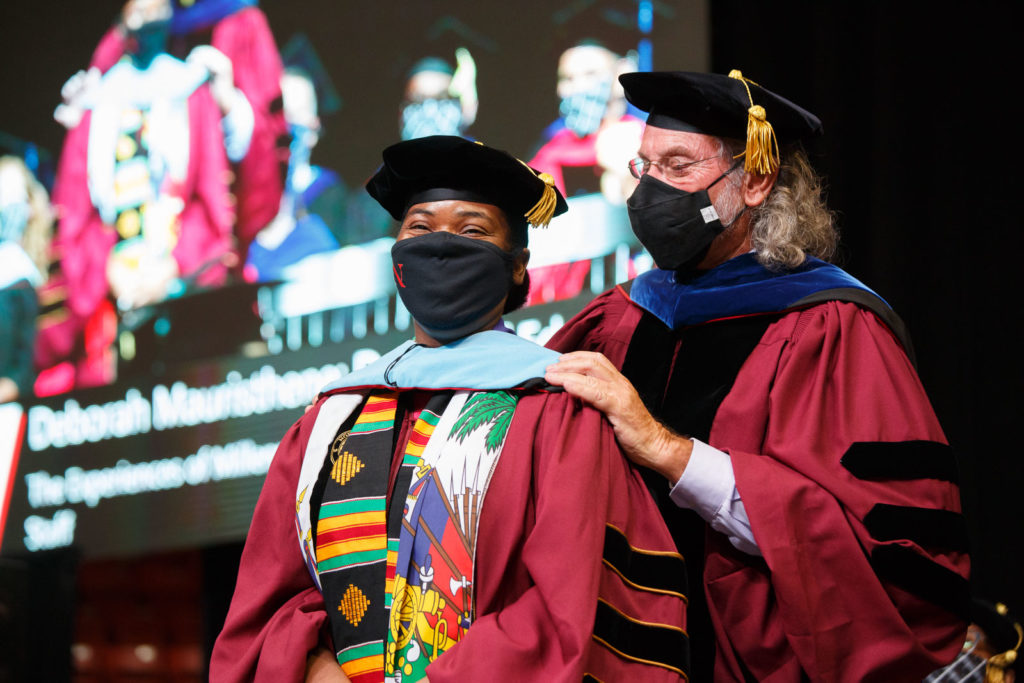
The words of Brent Musson, (Doctor of Law and Policy ’20), captured the mood at the Doctoral Hooding and Graduation Ceremony of the College of Professional Studies in Matthews Arena Sept. 9—and at the Master’s Graduation Ceremony in the same location the following day: “Humanity at its best,” the 2020 Dean’s Medal recipient said in his remarks to the successful doctoral candidates, “is humanity in gratitude.”
Gratitude was in abundance both days as faculty, administrators, students and their families—as well as friends of the College worldwide via livestream—celebrated the graduates’ achievements in the face of extraordinary challenges. Speakers at the ceremonies praised the degree recipients for their perseverance in scholarship despite a global pandemic, their passionate commitment to learning and their determination to address real-world problems in their project-based learning and research.
‘Both humility and pride’
In his opening remarks on Sept. 9, Provost and Senior Vice President for Academic Affairs David Madigan, Ph.D., welcomed the College of Professional Studies (CPS) community, expressed his faith in the graduates’ future success and his pride in their accomplishments and celebrated their membership in Northeastern’s “powerful knowledge network” dedicated to the dream of a more just and equitable society. He was followed at the podium by Interim Dean of CPS Dr. David Fields, who noted the unusual degree to which CPS students break down the barriers between work and learning.
“Our doctoral students are already fulltime professionals and leaders in their fields,” Dr. Fields observed. “In true Northeastern fashion, they are researching what they live, and living what they research, every day.”
Dr. Fields went on to explain the significance of the hooding ceremony—so-called because doctoral students traditionally have the hoods of their academic regalia lifted over their heads by faculty.
“The symbolism of the hooding ceremony at our doctoral commencement honors both the doctoral candidate’s work and the network of relationships that make that work possible,” Fields said. “[It] embodies both humility and pride, on both sides of the relationship, as faculty members welcome a new peer into their community.”
Faculty speaker Dr. Mounira Morris (B.S. ’91, M.S. ’95), assistant teaching professor and the co-lead for the Master of Education in Higher Education Administration program, offered her congratulations to the graduates and acknowledged the special challenges that had arisen during their studies, including the pandemic and the persistence of racial injustice. She quoted James Baldwin, noting his achievements as a playwright, novelist and civil rights activist: “Not everything that is faced can be changed, but nothing can be changed until it is faced.”
“To me,” Dr. Morris said, “this means that at times we will collectively endure hardship; however, we can use these experiences, especially as doctors, to offer wisdom, hope, and a better path forward.”
A longtime leader in diversity, equity and inclusion (DEI)—and currently working with colleagues at Northeastern to develop a new academic credential in DEI—Dr. Morris emphasized the power for good inherent in the attainment of an advanced degree, encouraging the graduates to find creative solutions to the challenges in their professions, communities and personal lives.
“We, as faculty,” she said, “ask that you take your research, and go out and change your world, your profession, your workplace and make it just a little bit better than before. We, as faculty, believe you can persevere and persist. We know you can.”
Intellectual explorers
Dr. Musson, whose acceptance of the 2020 Dean’s Medal had been previously postponed due to Covid-19 precautions, suggested in his remarks that the attitude of an academic researcher is “not that of an author or maker, but rather that of an explorer.” He praised the selflessness and commitment of his peers and made a critical distinction between an undergraduate education—which, he said, “teaches a student how to learn”—and a graduate education, in which students learn “to use tools … to solve other people’s problems” and to create value, going “from inward-facing to outward-facing.”
He noted that, soon after a doctoral candidate’s academic journey begins, “we become acutely aware of what we’re signing up for; to spend the next few years engaged in the most rigorous intellectual exercise of our lives, to extract a single, pure, tiny drop of insight to ever-so-slightly raise the sea level of the ocean of human knowledge.”
And he described a moment of inspiration in what he termed a spiritual awakening: a street soccer game he had observed in West Africa more than a decade earlier, where, when a beautiful goal was scored, both teams celebrated. Drawing a parallel between the players’ selfless joy and the academic community he had found at Northeastern, Dr. Musson said, “These happy boys had purpose; and that purpose made them work together, against all odds to orchestrate a moment of greatness—a moment of pure, unselfish greatness.
“I’ve never circled a soccer field making wings with my arms,” he continued, “but research has made me part of our team, and this humbling honor is our winning goal.”
As Dr. Musson finished his speech, the audience rose to deliver a sustained standing ovation.
At the conclusion of the ceremony, Dr. Madigan returned to the stage to offer closing remarks, praising the successful doctoral candidates for their “drive, dedication and sense of purpose.”
“The world is ever changing,” he said, “but you are prepared to meet—and conquer—its challenges.”
Master’s Ceremony
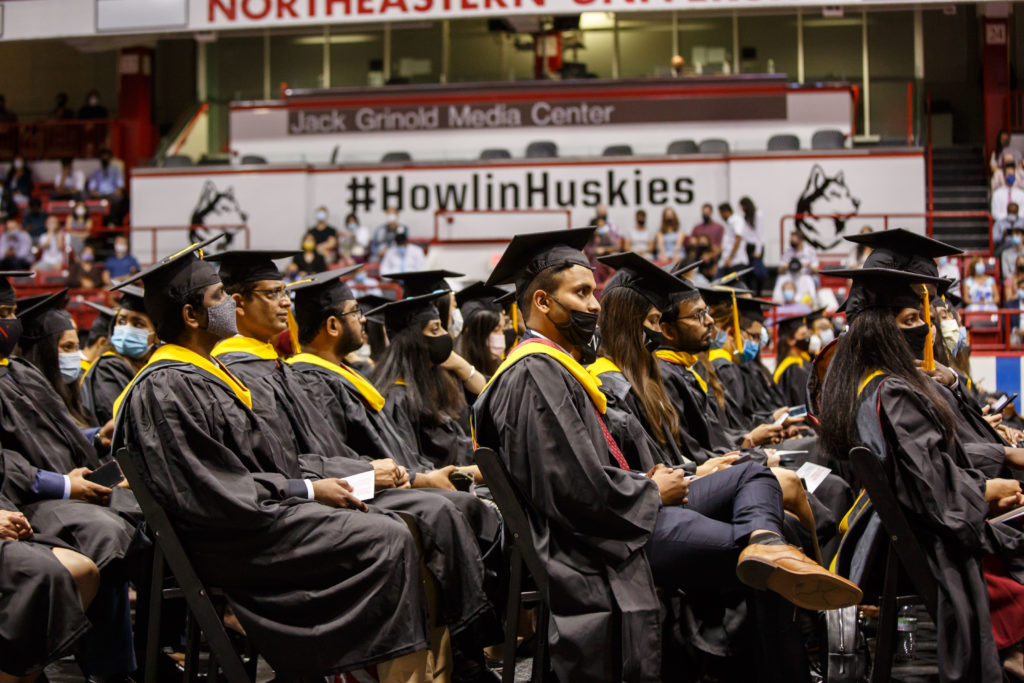
‘A day full of promise’
The following afternoon, Dr. Madigan returned to welcome master’s graduates to the arena on “a day full of promise.” He praised their “clear-eyed determination, discipline and hard work,” and offered special recognition to the faculty who, he said, by guiding the graduates to success, “have strengthened a legacy of knowledge and helped shape the future in scores of fields of professional endeavor.”
Following Dr. Madigan’s remarks, Dr. Fields spoke, celebrating the graduates’ global engagement and their cultivation of “the cultural competencies needed for a lifetime of contribution in a fast-paced, diverse, global society.” He went on to emphasize the benefits of their embrace of experiential learning, noting that in so doing, they had “addressed pressing, real-world problems” and become “well-prepared to lead from experience in the workplace.”
Dr. Fiona Creed, associate teaching professor and faculty director of the Global Studies and International Relations program, next introduced student speaker Ebony Small, ’21.
Reflecting on a year of adversity, Small observed “the pandemic itself could neither make nor break us” and asked graduates to consider the ways in which the challenges of the past 18 months had taught them to know their own courage, ambition, and steadfastness.
“We did not make it to this moment merely because we just-so-happened to survive a global pandemic,” Small said. “No, we made it here because we made the choice to value education and then fiercely pursued it. My dear friends and colleagues, despite the unexpected challenges of this year, we thrived. We grew. We changed.”
“This,” she concluded, “is what it looks like to turn a choice into a change. This is what it looks like to champion growth. Congratulations.”
From humble roots to world-renowned
Following an introduction by Dr. Earlene Avalon, associate professor and lead faculty for Health Administration and Health Sciences, graduation speaker Carl H. Whittaker, a philanthropist whose life path has spanned business, engineering and music, addressed the community.
A director of the Herb and Maxine Jacobs Foundation—which supports the College’s “A2M” or “Associates to Masters” program, offering an accelerated pathway from a community college associate’s degree to a bachelor’s at the College of Professional Studies and a master’s degree in Biotechnology at Northeastern’s College of Science—Whittaker began by invoking Northeastern’s origins as a vocational school offering evening classes, run by the YMCA.
“We all know that Northeastern is now a world-renowned university, highly ranked in many fields,” Whittaker said. “But inside this world-class institution is still the legacy of that 1898 night school.”
Whittaker linked this history with Northeastern’s emphasis on internship experiences, co-ops, and other programs that connect students to “great employers and great jobs.” He applauded the graduates for their effort and creativity in juggling jobs, families, and studies, urged them to embrace the role of mentor for other aspiring scholars, and invited them to fight income inequality—as his foundation does in part by supporting scholarships at Northeastern.
“I am inviting each of you to join my fight against economic inequality by encouraging at least one or two others to join you in earning an advanced degree,” Whittaker said. “Just be ready when you see a family member or neighbor who would value your guidance. Your friendly support might be thing that leads someone to a more prosperous and fulfilling life.”
The Doctoral Hooding and Master’s Ceremony were livestreamed from Matthews Arena. Click the links below to view recordings of the ceremonies.
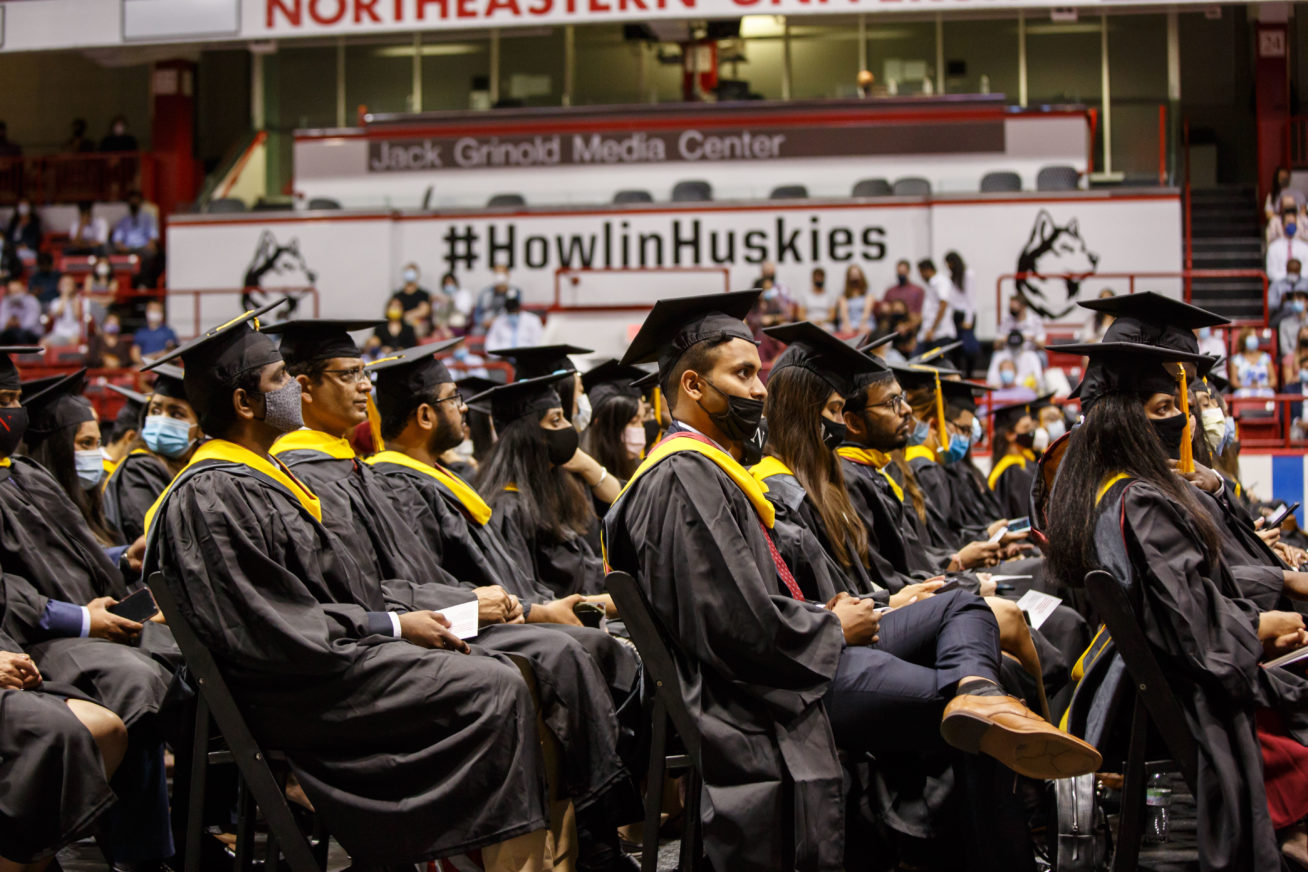
Watch the Ceremonies
The Doctoral Hooding and Master’s Ceremony were livestreamed from Matthews Arena. Click the links below to view the graduation pages and watch recordings of the ceremonies.